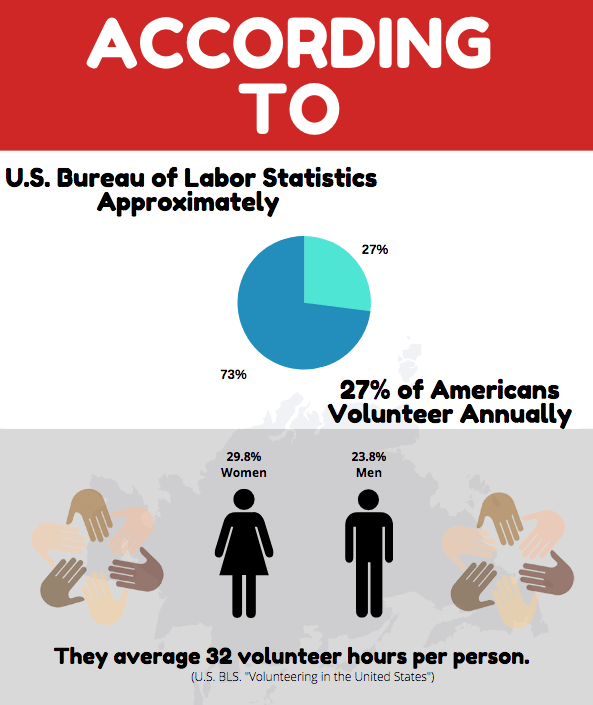Tip #8 to Improve Employee Engagement
Research conducted by Washington, D.C.-based Corporation for National & Community Service reveals that charitable work literally makes the heart grow stronger. Individuals with coronary artery disease who participate in volunteer activities after suffering a heart attack report a reduction in despair and depression, driving down mortality and adding years to life. Research from the Center for Work-Life Policy shows that high-potential employees are seriously motivated by a desire to give back to the world, and increasingly seek out employers that allow them to participate on company time (Harvard Business Review. "Increase Engagement by Encouraging Employees to Volunteer").
Tip #8: Promote Your Organization's Community Engagement and Social Responsibility Programs, or Simply Encourage Your Team to Volunteer.
If your organization does not have a community engagement and/or social responsibility program, we encourage senior leaders, HR, and Marketing professionals to invest in developing one because of the tremendous impact a program can have on an organization's culture and brand. At minimum, leaders are encouraged to look for community service opportunities for their team.
Below are a few considerations for leaders to keep in mind:
- Who would you like to help? Before selecting a community service project, leaders should ask their team for suggestions. Look for projects that relate to your team's passion and interests.
- Can your team serve as skilled volunteers? Skilled-based volunteering takes advantage of individuals’ professional training (e.g., licensed registered nurse, electrician, plumber), skills (e.g., resume writing, interview guidance), and experience to help service organizations bring professional support to the community. If your team can serve as skilled-based volunteers, look for community service partners that provide skilled-based volunteering opportunities.
- Recurring vs. One-time event? If the team cannot commit time to support recurring volunteer opportunities (e.g., mentoring students), look for volunteer opportunities that can be completed in one outing (e.g., Habitat for Humanity, volunteering at a local food bank).
- Do you want to quantify your volunteer impact? If your team is numbers-driven and wants to quantify the impact of their volunteer efforts, look for volunteer opportunities where the community service partner can provide specific stats (e.g., # kids tutored, # meals prepared, # cans of food collected). This is in contrast to activities that don't have clear numbers, such as cleaning up a playground, creating a garden, or serving as a volunteer chaperone.
Looking to invest in a formal community engagement and/or social responsibility program?
Corporate community engagement and social responsibility programs are not new concepts, but we find that most organizations are not maximizing their efforts. In addition to answering the questions we recommend leaders answer before coordinating a volunteer event for their teams (see above), we encourage organizations to answer the following:
- Who are the community partners that best align with your organization's strategy?
- How many causes or focus areas do you want to support?
- Will the organization give time (i.e., allow flexibility for their employees to volunteer), money (i.e., cash donations or employee match program), or both?
Assuming these statistics hold true for most organizations, employees at an organization with 1,000 employees may be volunteering 8,640 hours annually (8,640 = 1,000 people x 27% x 32 hours/year).
Imagine the employee engagement, recruiting, and marketing impact if the employees volunteering 8,640 hours volunteered alongside their colleagues wearing the organization's t-shirts. Strategically providing your employee base with volunteer opportunities will increase the % of employees volunteering and the number of hours they volunteer.
Contact IMC at info@imc.consulting if you would like to learn more about our community engagement and social responsibility program support.


